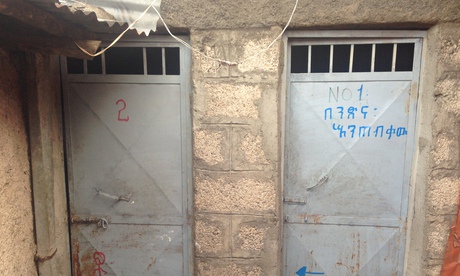Ethiopians' plight: 'The toilets are unhealthy, but we don't have a choice'
Officials plan to build extra public conveniences in Addis Ababa, which has just 63 loos for its 3 million inhabitants

Community toilets in Addis Ababa typically consist of a hole in the floor.
Addis Ababa has more than 3 million people, but there are just 63 public toilets. At one, in the oldest part of the city, there is constant activity and bustle as people queue to pay varying prices for a urinal, full cubicle or shower in the white-tiled facility inside a circular yellow building. For many, this is the only option because of the lack of provision in their own homes.
Nine in 10 households use "non-improved" toilet facilities, according to the Wash Ethiopia Movement . The most common type of non-improved toilet is an open pit latrine or pit latrine without slabs, used by 57% of households in rural areas and 43% in urban. Only one in 25 households has access to improved toilet facilities which are not shared with other households.
Mesay Berhanu, a spokesman for the movement, said: "Many people have shared toilet facilities which they would not find very comfortable. They might have to line up for some time to make use of the facilities. As a result, you may find people doing it here or there along the street."
Government figures show that diarrhoeal diseases are among the 10 most prolific in the country. "These are one way or another linked to an unhygienic environment," Berhanu added.
Waste can accumulate because service providers are stretched. "There is a huge problem in liquid waste management. The number of vehicles they have to collect it is limited. People might have to wait two or three months. We have a very small number of private operators in liquid waste collection." Progress has stalled, Berhanu said, because of bureaucracy. "A year ago there was a plan to create more than 1,000 public toilets, but there is a lack of co-ordination between different departments of government.One of the main challenges is the coordination of the various actors."
But officials in this fast-developing city say they have a 100m birr (£3m) plan to build an extra 25 public toilets within the next year along with 103 community and 289 mobile toilets, the latter equipped for pregnant women and people with disabilities. About 150 areas have been identified, including markets and bus and train stations.
Mulugeta Kemise, of the Addis Ababa Water and Sewerage Authority , said: "We are trying to improve the lot of the downtrodden masses. After five, six or seven years you'll see the difference. We are doing our best to transform the lives of our people."
At a community toilet shared by 35 households in an impoverished neighbourhood of Addis Ababa the scene is typical: behind a corrugated iron door, beside dirty scraps of paper and tissue, is a small, dark hole in the floor. Above, a cable runs to a naked lightbulb. The stench is rank. These four toilets are used by more than 200 people a day. Those who live here describe them as undignified, unhygienic and inhuman.
"They're dirty and it's not good for our health," said Berhane Keraga, 45, a housewife who gave birth eight times here. "They make a lot of men, women and children ill with typhoid and diarrhoea. A couple of months ago I got sick and had to go to hospital because of these toilets. I felt cold and shivering and had a headache and stomach ache."
The lavatories, housed in concrete blocks under a corrugated roof, encourage flies and rodents. "There are really black scary rats that come and run on our feet. It's disgusting, and when my children use these toilets I feel really bad." Nor is there separation between men and women, Keraga added: "It's undignified for women. It's difficult for me to use sanitary products. Some women urinate in bowls at home then dispose of them."
Since the toilets were built by a non-government organisation more than a decade ago they have been neglected, despite appeals to the government. The community pays 1,200 birr for waste removal once or twice a month and has recently started charging outsiders 1 birr to use them. Girma Taddese, a furniture maker, said: "These toilets are not safe, healthy or hygienic for children. A lot of people fall sick because the toilets get filled quickly. The smell is very disgusting. It fills the air and our kids play on the ground. We can't take it." Holding his two-year-old daughter, Blen Girma, he adds: "I don't like her using these toilets. I feel so sad about our lives, but we don't have a choice.

No comments:
Post a Comment